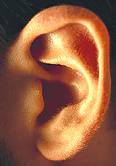
THURSDAY, Feb. 11 (HealthDay News) — Scientists know a lot about how the ear and brain interprets sound; now they know it uses different mechanisms in times of silence.
U.S. researchers say they’ve spotted mechanisms used by the brain to switch off sound processing at key moments.
“Being able to perceive when sound stops is very important for speech processing. One of the really hard problems in speech is finding the boundaries between the different parts of words. It is really not well understood how the brain does that,” psychology professor Michael Wehr, a member of the university’s Institute of Neuroscience, said in a news release..
For example, background noise at a party can make it difficult for some people to follow a conversation.
Tests on rats revealed that this kind of regulation — which is crucial for hearing and understanding speech — is controlled by an independent channel of synapses inside the brain’s auditory cortex, said the University of Oregon team.
“It looks like there is a whole separate channel that goes all the way from the ear up to the brain that is specialized to process sound offsets,” Wehr said.
The separate channels from each ear meet in the auditory cortex, which is located in the temporal lobe.
This discovery could lead to new ways of helping children with speech and learning problems, and may help improve the design of hearing aids and cochlear implants, Wehr said.
The study appears in the Feb. 11 issue of the journal Neuron.
More information
The American Speech-Language-Hearing Association has more about hearing loss.

